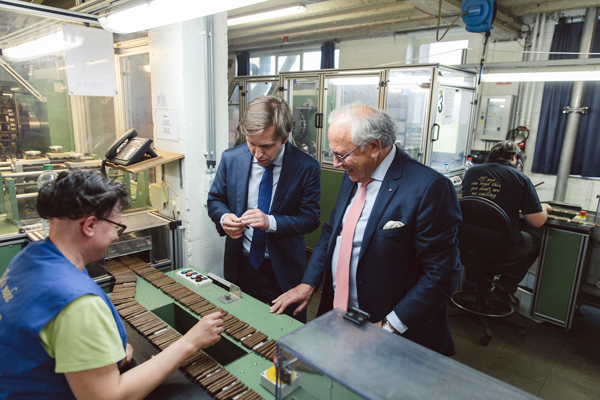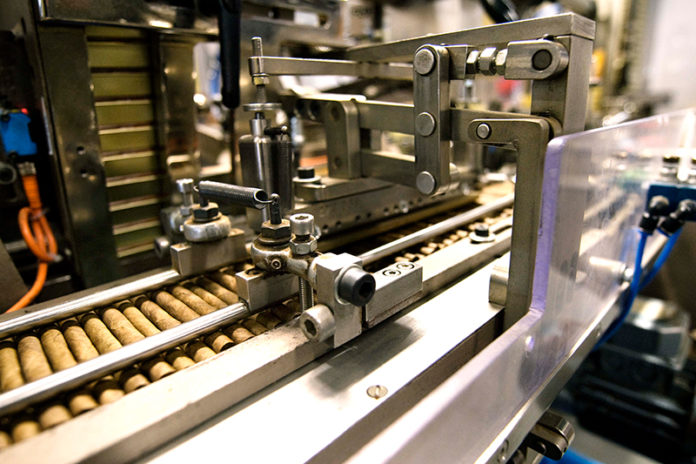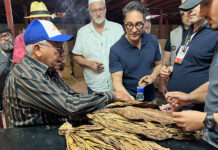There’s a level of mystique and romance that surrounds handmade cigars. This product’s story begins in the tobacco fields of Cuba, Honduras, the Dominican Republic and Nicaragua, where tiny seedlings are carefully planted into the ground and cared for until they grow and develop into hearty green tobacco leaves that are later harvested and dried. After being aged, the leaves are transported into factories where they are sorted by hand and prepared for the bunchers and rollers who make them into cigars that are then transported around the world. Hundreds of hands touch the leaves and handle the cigars, ensuring each finished product meets the highest standards of quality so that it can be fully enjoyed by cigar smokers around the globe.
The art and romance surrounding handmade cigars can be lost for some with the mention of machine-made cigars. The phrase “machine-made” conjures up thoughts of cold, detatched, mass-produced cigars that are made cheaply and quickly and without that human touch that makes handmade cigars so special. On the international front, smokers have a completely different relationship with machine-made tobacco products. Machine-made cigars go by several names, including small cigars, cigarillos, short fillers, tin cigars or even cafe cigars. Many premium cigar manufacturers have some form of these smaller cigars in their portfolios, and these cigars are also stocked on the shelves of convenience stores, discount tobacco outlets and even premium tobacconists. While small cigars are popular in international markets, they have not yet fully caught on in the United States. Retailers and consumers in the U.S. have not been fully educated on these smaller cigars. Many questions abound about these products—–is the quality of a smaller cigar less than that of a larger, handmade product? Are small cigars made of cheap tobacco? Are small cigars similar to cigarettes?
In Europe, smaller cigars were developed as a replacement for regular-size handmade cigars. In regions that receive cold and inclement weather, short cigars provide the perfect solution for people who have to smoke outside because they can be consumed in a shorter timeframe. In the U.S., these same cigars are grouped in one category by many retailers and consumers, simply viewed as little cigars or cigarillos. Short cigars are often made out of the same high-quality tobacco found in standard-sized cigars. These cigars have the same flavor and aroma of a normal cigar—they are simply made in a smaller, more compact size, making them easier to carry and a convenient smoking option for those looking for a premium cigar experience that can be enjoyed in a short amount of time.
While cigars made by machines may not have the same endearing back story as their handmade counterparts, these premium tobacco products can offer consumers a high-quality smoking experience at a more affordable price point, adding to the bottom line of the savvy retailer that knows how to sell and market these smaller cigars in the right way.
Major Players
Several companies use machines to help produce certain tobacco products in their portfolio. Low awareness and a lack of understanding of premium small-format cigars in the U.S. have not kept manufacturers from getting into the small-cigar business. Davidoff, Drew Estate, General Cigar Co., Altadis U.S.A. and Arturo Fuente are among the manufacturers that have small-format cigars on the market. There are also companies like J. Cortes, Villiger Sohne AG and Royal Agio Cigars that have had great success with small cigars in international markets and that are now helping to educate the U.S. on this popular and profitable size. Since 1926, J. Cortes has manufactured machine-made cigarillos. Machines were used to make these products due to the challenge the size of these cigars would present to a traditional roller.

“Our family business has been active since 1926, and we have been making machine-made cigarillos from the very beginning,” says Fred Vandermarliere, CEO of J. Cortes. “This type of cigar is so small that it is impossible to make by hand. To make a blend, you need to cut your tobaccos small and blend them well. To roll them around this cut filler leaf, it is not easy to do it manually and especially ensure a perfect draw. However, there is still a significant manual part in the production process. A machine is unable to cut the wrapper out of a beautiful wrapper leaf, so this is still done fully by hand.”








